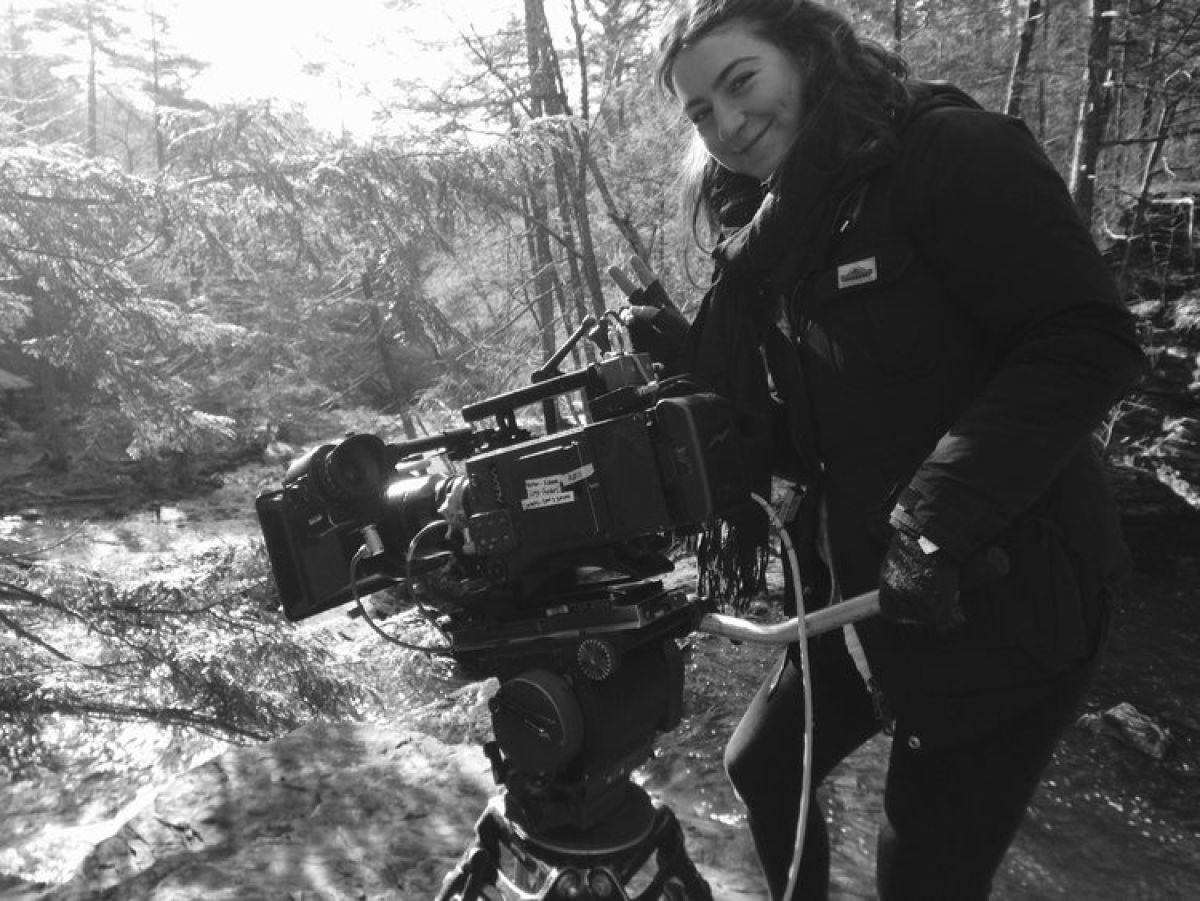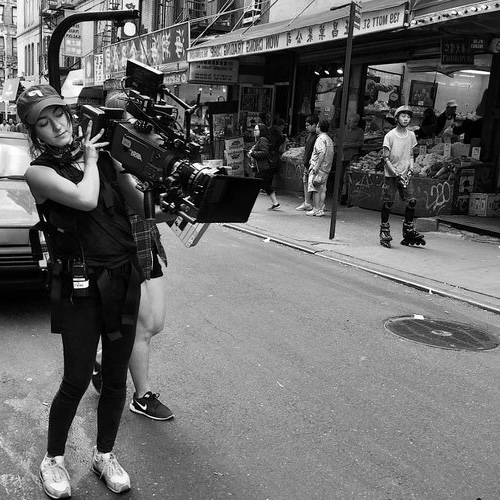Laura Hilliard Interview: “Storytelling is a noble profession”

Laura Hilliard is a cinematographer from Pennsylvania and teaches 16mm cinematography at the University of Salford. Having worked on shoots with VICE, Nike, Teen Vogue, and many more, Laura is a skilled cinematographer with a wonderful personality that strives to create opportunities in the industry for marginalised filmmakers.
Do you prefer to be called a Cinematographer or Director of Photography?
I honestly don’t care. I think it’s confusing for people who aren’t in the industry. It’s the same job. I guess, Director of Photography is the job and cinematography is the verb, as in the act.
How creative are you allowed to be on your projects?
Sometimes cinematographers are hired because they can do a certain look. Other cinematographers are hired because they adapt to whatever project it is. I fit into the second camp. Sometimes you can’t light it all in crazy colours or make it super soft…you just need to give the client or the director the genre. I find that I get over those excitements or disappointments in pre-production and then once I get on set, it’s really about the joy of everything going awry and this is creative for me and fun. I think you have to love the doing of it and problem solving. Ultimately, for me, cinematographers always have a responsibility to the director and what a story is about.
How important is the collaboration aspect of filmmaking?
The collaboration is essential. You can’t make films on your own. Well, you can but for the projects that I want to work on they’re gonna be with bigger crews and being able to work with people. That’s what makes it run. Being a cinematographer is really about understanding the roles of the crew that you’re managing and being able to tell them what you need in a clear way. It’s really good to do all the crew roles to empathise with what their day and work is like. I definitely have less gaffing experience and I wish that I could be a bit better with my gaffing…so that would make me a better cinematographer to be honest.
I think it’s one of the hardest things to teach because you’re marked on a group grade and students hate that, and I would hate that, but there are so many projects that you have to work on as a professional. You have to work with people you don’t like or people you find really challenging. You have to figure out a way to make it happen to motivate people to want to work for you. The reason why I’ve looked up to my mentors has been because they really know how to inspire a crew to work really hard for them. It’s kind of like playing on a football team and the captain is great… and those are rare.
How crucial is film school to become a professional filmmaker?
I think it is up to the individual…is it right for you at that time? Can you take advantage of it the most? It’s [film school] a very modern thing. Before you worked your way up. That still exists and you can learn everything you need to know on set. That being said, film schools offer more opportunities to different types of people and a learning environment but it costs money, which sucks. People are in massive debt and that brings the question: are they worth the money? I have a lot of friends who never went to school and are doing well in the industry and don’t have any debt.
To practise with cameras in a learning environment is really good because it means that we take off the pressure of the set. When I teach 16mm if we scratch a roll [of film] that’s ok because everybody makes mistakes and you’re learning. If it was on a set that means we’ve lost a whole day of shooting. That’s stressful. That’s where I think film school is really good.
What is your experience in such a male-dominated space?
Cinematography is what 3% women? It’s so small. I had the experience in school of feeling like I was working twice as hard to get half as far and it was frustrating to me. I did the homework and my guy friends on the course would get the project without doing any prep and I wouldn’t. They get the benefit of the doubt and women and minorities usually don’t. You’re a white man and pick up a camera and people trust you and if you’re not you have to be seen doing the thing but how do you do the thing if no one will give you the opportunity to do the thing. It’s funny but the picture of you with the big camera is important to have on your website because once people see that on your website they think “oh she’s serious”… which is so silly but it’s true. That is also when the reel [filmmaker portfolio] comes in and is important.
Creating opportunities and realising that we have a lot of work to do. In my class, I have to figure out a way to make sure that each person gets the same opportunity to touch the camera in the same way to help them build confidence. It starts there. You have to put an intervention in place in teaching where each person gets to do everything one bit at a time to avoid creating bigger and bigger gaps.
I find that there is a really amazing comradery when you meet women working in the industry. I want to help every woman that wants to be a cinematographer so much, I will give them so much time of day. I have a bias towards getting more women and people of colour behind the camera and I would stand up to that if anybody challenges it.

Is there pressure to keep up with technological advancements in film and what do you think about these new technologies?
There is loads of pressure to keep up with it all. I remember when I was in film school and I had a lot of friends who were really nerdy and read all the output surrounding technology in film. That’s great and we need people like that but I am not like that, I used to feel insecure and think I can’t be a cinematographer because I’m just not like that. It’s good to be open to realising that you can’t know everything and asking informed questions.
The way that you learn it [filmmaking equipment] is to use it on set. There were some pieces of kit that we brought to the set last week that I had never seen and I was so excited because I didn’t know we could do that. You kind of know about the tools and the tool box and there is always something new but for the most part you will feel confident that you can hold it all in your brain.
There is a cap. I don’t think the VR stuff will replace the cinematographer. We need people to do the thing. The jobs are changing but there is so much that is the same. It’s also creating new jobs. All the VFX stuff is crazy and great. It is also a barrier to entry and to access for anybody who isn’t already in it or going to the school and that I think is problematic in many ways. That stuff is frustrating but that is the industry and I hope that that stuff is phasing out and that there are more points of entry.
Do you have any advice for any up-and-coming filmmakers?
Make as much stuff as you can. Sometimes it gets scary to put the crew together. That’s one of the joys of film school, that you have to make a load of stuff and when you get out nobody makes you make loads of stuff anymore. You have to create the energy to do it. You do it but it becomes harder. Just keep making films and love seeing films too. Reminding yourself why it’s amazing to go into a cinema and the lights go down and that feeling of seeing a great film. That’s what we’re doing. But sometimes it feels so far from that and so it reminds you that storytelling is a noble profession. Be kind to your body, to yourself and be patient. I definitely did too much heavy lifting and hard labour that made permanent damage. I have back problems that will never go away because of too many hours of camera operating.
A piece of advice for third year students, it’s a scary time and it can feel like you’re floundering. You don’t need to know the whole year or the next five years. Just figure out what you’re going to do for the first three or six months, whether that’s working at a café or something and writing a script figuring out finances [for a film]. Give yourself really small and achievable building blocks.
Advice for up-and-coming cinematographers?
For cinematographers, try and be on as many sets as you can and work for different types of DoPs as you can. Value your time and your labour. Pretty early on you should be paid for it as a camera trainee. There is an expectation that you have to do a lot of free labour to make it happen and I disagree with that. Seek out sets that are exciting projects and that are going to be run well. There is nothing worse than working on a poorly run set. It’s just not worth the energy. Practice and notice lighting in rooms and buildings and how it impacts things.







